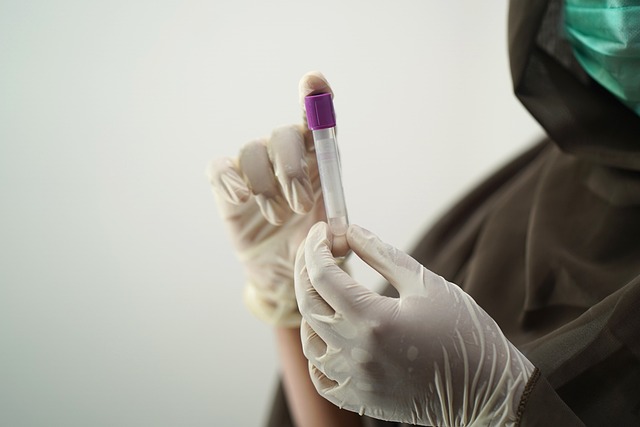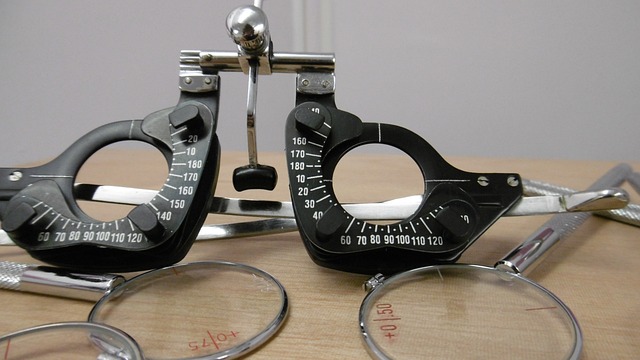The UK's healthcare system relies on the kidney blood test, particularly the serum ferritin component, as a primary diagnostic tool for iron deficiency anemia. This condition, characterized by low iron reserves and symptoms like fatigue and pallor, is effectively identified through this test within the NHS framework. The serum ferritin levels measured reflect body iron storage, with low levels indicating potential iron deficiency and early anemia. The test also provides insight into kidney function, crucial for differentiating it from other conditions with similar symptoms, such as chronic kidney disease, which can affect iron metabolism. Healthcare professionals use this test in conjunction with serum iron and total iron-binding capacity tests to offer a comprehensive evaluation of iron status. Early detection through these tests enables prompt intervention, potentially leading to better health outcomes. For UK residents, understanding the importance of the kidney blood test is key to early diagnosis and effective management of iron deficiency anemia, with dietary adjustments or supplementation as part of treatment. The NHS supports patients with specialized information and guidance, emphasizing the role of ongoing monitoring and communication with healthcare providers for successful treatment and recovery. Keyword: Kidney Blood Test UK.
Iron deficiency anemia, a prevalent health concern, can be accurately detected through a Kidney Blood Test, a diagnostic tool widely accessible in the UK. This article elucidates the condition, the significance of the Kidney Blood Test in its diagnosis, and the subsequent steps following a positive result. Whether you’re seeking to understand the medical intricacies or navigate post-diagnosis care, this guide tailored for UK residents offers clear insights into managing iron deficiency anemia effectively.
- Understanding Iron Deficiency Anemia and Its Diagnosis Through Kidney Blood Test in the UK
- The Role of Kidney Blood Test in Detecting Iron Deficiency Anemia: A Comprehensive Guide for UK Residents
- Navigating the Aftermath: What to Do Post-Diagnosis of Iron Deficiency Anemia via Kidney Blood Test in the UK
Understanding Iron Deficiency Anemia and Its Diagnosis Through Kidney Blood Test in the UK

Iron deficiency anemia is a prevalent condition characterized by insufficient iron stores in the body, which leads to a reduction in hemoglobin and the formation of fewer oxygen-carrying red blood cells. This can result in symptoms such as fatigue, pale skin, and shortness of breath. In the UK, healthcare providers utilize various diagnostic tools to detect iron deficiency anemia, with the kidney blood test, also known as serum ferritin, being a key examination. The kidney blood test measures ferritin levels in the bloodstream, which is a protein that stores iron and is an indicator of body iron stores. When ferritin levels are low, it suggests depleted iron reserves and may indicate iron deficiency anemia.
The process for diagnosing iron deficiency anemia with a kidney blood test in the UK is straightforward yet precise. The National Health Service (NHS) provides this test as part of a comprehensive approach to anemia diagnosis. Alongside the serum ferritin test, other related tests such as serum iron and total iron-binding capacity (TIBC) are often conducted to provide a more complete picture of iron metabolism. These tests are instrumental in guiding treatment decisions, which may include dietary changes, iron supplementation, or further investigation if other underlying causes of anemia are suspected. The accuracy of these kidney blood tests ensures that patients receive the most appropriate care and management for their condition, reflecting the high standards of healthcare within the UK.
The Role of Kidney Blood Test in Detecting Iron Deficiency Anemia: A Comprehensive Guide for UK Residents

In the UK, the detection of iron deficiency anemia often involves a variety of diagnostic tests, with the kidney blood test, specifically the serum ferritin test, playing a pivotal role. This test measures the levels of ferritin in the blood, a protein that stores iron in the body. Low ferritin levels are indicative of iron deficiency and can be an early sign of anemia. For UK residents, understanding the significance of this test is crucial, as it not only confirms iron deficiency but also helps in ruling out other conditions that might cause similar symptoms. Additionally, the kidney blood test can assess the function of the kidneys, which is essential since chronic kidney disease can also affect iron metabolism and lead to anemia of chronic disease. Early detection through regular kidney blood tests can lead to timely interventions, improving health outcomes for individuals at risk.
Furthermore, the kidney blood test is instrumental in tailoring treatment plans specific to the individual’s condition. In the UK’s National Health Service (NHS), healthcare providers may use this test as part of a comprehensive approach to diagnose and manage iron deficiency anemia. It is often complemented by other tests, such as serum iron and total iron-binding capacity measurements, to provide a complete picture of the body’s iron status. For UK residents, staying informed about the role and significance of kidney blood tests in the context of iron deficiency anemia detection is key to proactive healthcare management and maintaining overall well-being.
Navigating the Aftermath: What to Do Post-Diagnosis of Iron Deficiency Anemia via Kidney Blood Test in the UK

After receiving a diagnosis of iron deficiency anemia via a kidney blood test in the UK, it is crucial to take immediate steps to manage and treat the condition effectively. The kidney blood test, specifically the serum ferritin level measurement, is a reliable indicator of iron stores within the body. Following diagnosis, your healthcare provider will likely recommend dietary changes rich in iron, such as incorporating more lean red meats, dark green vegetables, legumes, and fortified cereals into your daily meals. Additionally, iron supplements may be prescribed to replenish depleted iron levels. Monitoring the progress of treatment is essential, with follow-up appointments scheduled to assess blood iron levels and adjust treatment plans as necessary. It’s important to maintain open communication with your healthcare team throughout this process to ensure optimal health outcomes.
In the UK, healthcare services provide comprehensive support for managing iron deficiency anemia post-diagnosis. Patients are encouraged to work closely with their general practitioners (GPs) and possibly hematologists, who specialize in blood disorders. The National Health Service (NHS) offers resources, including patient information leaflets and dietary guidelines tailored to individuals with iron deficiency anemia. Furthermore, the NHS provides access to necessary treatments and regular monitoring through kidney blood tests, ensuring that patients receive ongoing care to effectively manage their condition. Understanding the disease, adhering to prescribed treatment plans, and maintaining a balanced diet are key factors in overcoming iron deficiency anemia and improving overall well-being.
In conclusion, iron deficiency anemia is a prevalent condition that can be effectively identified through a kidney blood test, a crucial diagnostic tool readily available in the UK. This article has outlined the significance of this test, how it functions, and the steps to follow after receiving a positive diagnosis. For those concerned about their iron levels, understanding the role of the kidney blood test is indispensable. It provides a clear and accurate means of early detection, enabling prompt management and treatment. With the information provided here, UK residents can navigate the healthcare system with greater confidence and take proactive steps towards maintaining their health and well-being. Remember to consult healthcare professionals for personalized guidance following a kidney blood test in the UK.
